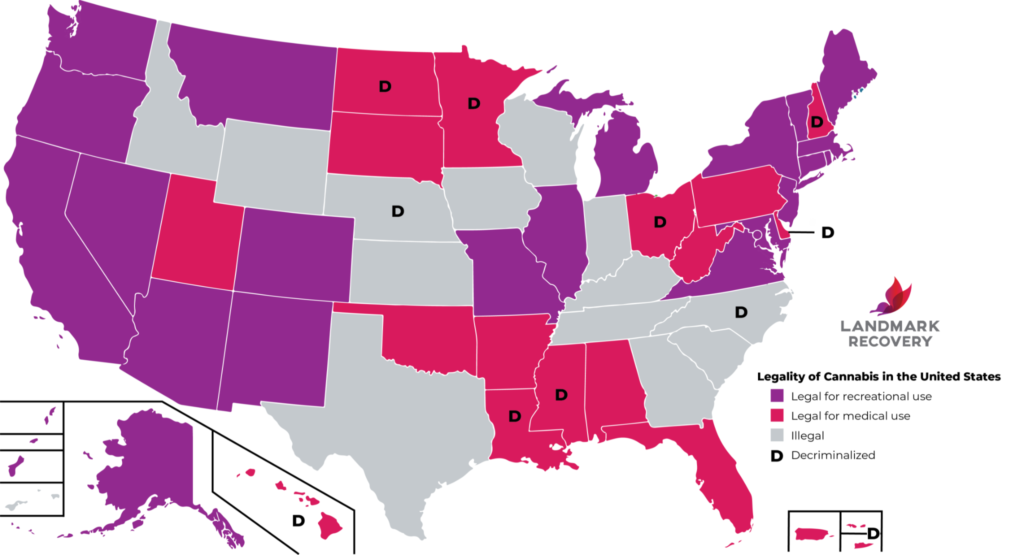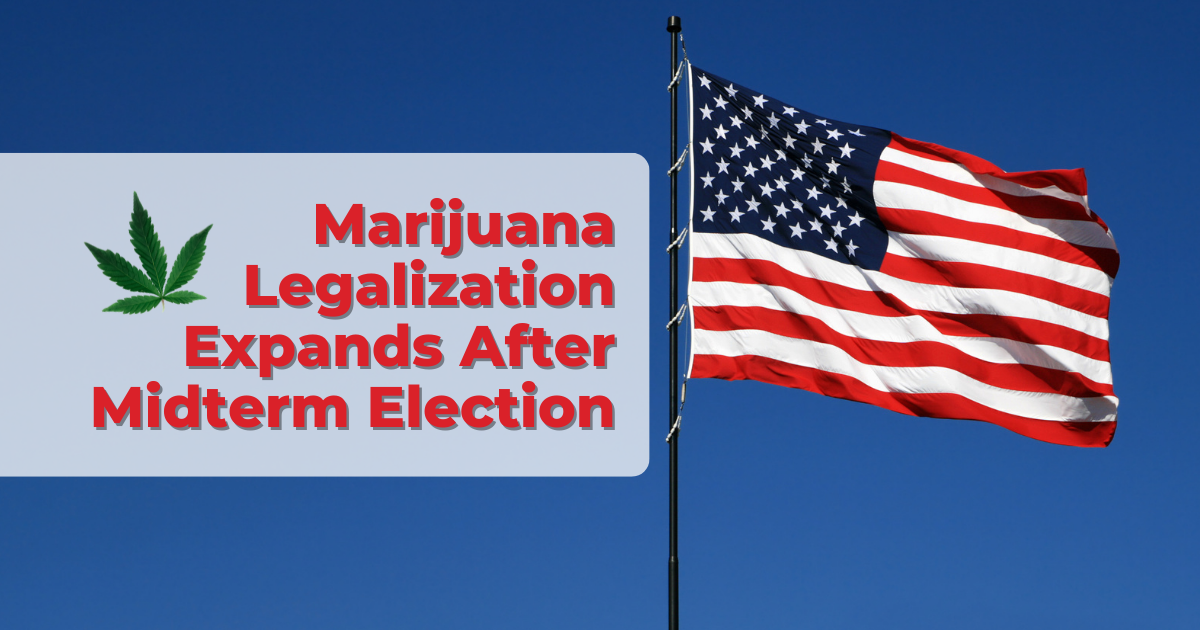During the November 2022 midterm elections, five states voted on the legalization of marijuana. Only two of the five states (Maryland and Missouri) effectively legalized marijuana on a recreational basis. Ballot measures to legalize cannabis in South Dakota, North Dakota, and Arkansas were not approved by voters.
Is Marijuana Really Legal in Some States?
Marijuana is legalized, decriminalized, or authorized for medical use on a state-by-state basis across the country. However, the use and possession of cannabis is illegal under federal law, as marijuana is currently classified as a Schedule I drug. Several federal politicians, including President Joe Biden, have called for marijuana reform.
“As I often said during my campaign for President, no one should be in jail just for using or possessing marijuana,” Biden said. “Sending people to prison for possessing marijuana has upended too many lives and incarcerated people for conduct that many states no longer prohibit. Criminal records for marijuana possession have also imposed needless barriers to employment, housing, and educational opportunities.”
Federal law would typically trump state law, but with marijuana legalized or decriminalized in more than 20 states things are getting complex. What it really comes down to is enforcement, and this part of our nation’s drug policy is in limbo as the federal government is taking a passive approach. An operative term here is the word “can.” The federal government “can” take action, but so far has not.

Map of marijuana legalization differences across the United States
Why Did Marijuana Legalization Fail in Some States, But Succeed in Others?
Maryland
- Maryland: 65.8% For. Adults 21 and older can possess cannabis with a variety of bills triggered that govern rules on businesses, possession, and implementation.
A complementary bill’s passage was automatically triggered upon approval of the ballot initiative that expunges convictions for conduct that became legal under the new law, provides grants to better support minority and women-owned businesses in the cannabis industry, and removes criminal penalties for possession of 2.5 ounces or less of marijuana. The purchase and possession of small amounts of cannabis is now legal for those above the age of 21, and adults can grow two cannabis plants for personal use. Full legalization will not occur until July 2023.
Missouri
- Missouri: 53.1% For. Legalizes the purchase, possession, consumption, use, delivery, manufacturing, and sale of marijuana for personal use for adults over the age of 21. Allows individuals convicted of non-violent marijuana-related offenses to petition to be released from incarceration and/or have their records expunged. Enacts a 6% tax on the sale of marijuana.
Despite the approval of the ballot measure, smokers of marijuana can still be fined for public smoking of the drug, while local governments can ban recreational marijuana through a public vote.
Where Voters Rejected Marijuana Legalization
The states with failed marijuana ballot initiatives had lower voter turnout for the midterm elections than in general election years, which, according to some election analysts, was the largest contributor to the lack of support behind legalization.
Arkansas
- Arkansas: 56.3% Against. Adults over 21 could possess and use up to an ounce of marijuana. Grants would be given to eight existing medical marijuana facilities so they could obtain a second license for non-medical sales.
In Arkansas, legalization interest groups faced opposition from the Arkansas Family Council Action Committee, which collaborated with former Vice President Mike Pence to spread their anti-legalization message. Their key arguments were that the legalization of marijuana would increase petty crime and spur on higher substance abuse rates in the state. Arkansas Governor Asa Hutchinson joined in on the campaign to stop the initiative from passing.
North Dakota
- North Dakota: 54.9% Against. The initiative would have legalized the possession of one ounce of marijuana for adults aged 21 and older. Up to three plants could also be cultivated in residents’ homes.
In North Dakota, opposition was evenly spread across the state, with only three counties voting in favor of legalization. The state also voted against legalization in the 2018 midterm elections. In 2021, House Bill 1420 was defeated in the state senate; H.B. 1420 would have created a path to legalization.
South Dakota
-
South Dakota: 52.9% Against. The ballot measure does not explain the state’s expected regulatory policies, but does say that state and local governments could ban its use in buildings that are “owned, leased, or occupied” by a government body, according to Marijuana Movement.
Curiously enough, South Dakota had already voted in 2020 to legalize marijuana recreationally, with 54% of voters casting a pro-weed ballot. The state’s governor, Kristi Noem, stopped the initiative from moving forward through a legal challenge. Noem said that she would not oppose further efforts if voters approved it during the most recent election. However, she campaigned against the initiative, swaying voters to her side. Noem is a highly popular figure in the state, winning reelection on Tuesday handily to continue the work she began in 2018 upon winning her first gubernatorial election.
How Popular Is Marijuana?
In April 2021, Pew Research, one of America’s largest polling groups, released their findings that 60% of Americans believe that marijuana should be legal both recreationally and medically; 31% of respondents to the poll said that marijuana should be legal for medical use only. Surprisingly, a very small 8% of respondents said that weed should be illegal, with 1% refusing to answer. This means that at least 91% of Americans believe weed should be legal.
What’s the Future of Marijuana Legalization?
Despite longtime promises to deschedule marijuana and change the law in the U.S., Democrats have failed to achieve their goal of legalizing marijuana on a recreational basis. Despite this, in October 2022, President Joe Biden pardoned thousands of those in jail for low-level marijuana offenses while requesting that U.S. Department of Health and Human Services Secretary Xavier Becerra and U.S. Attorney General work together to review how marijuana is scheduled under federal law. It appears that most Americans are pro-legalization and that the federal government is slowly moving towards a walk-back of the federal regulation of marijuana.
Is Weed Addictive?
Marijuana, contrary to popular belief, can be addictive. For many years, experts have vigorously debated whether cannabis is addictive or not. Studies have shown that around 9% of users will become addicted. More than 2% of American adults have experienced marijuana use disorder in the previous year, according to a National Institute on Alcohol Abuse and Alcoholism study. More than 6% satisfied the criteria for marijuana use disorder at some point.
The dependency rate in marijuana users jumps to 17% among those who started smoking marijuana as teens, according to 2015 data. One ongoing issue with substance abuse studies is the way addiction and dependence are often used interchangeably. From the viewpoint of some experts, it’s possible to become dependent on marijuana without being addicted. Across the United States, roughly four million people satisfy the criteria for marijuana use disorder. Of these people, 138,000 voluntarily engaged in treatment for marijuana use.
Learn More
To learn more about how Landmark Recovery can help those suffering from a cannabis use disorder, give us a call at 888-448-0302 to speak with a dedicated admissions consult. Our admissions consultants can walk you through how we treat our patients and the admission process to make it as easy as possible. Our mission is to save a million lives in the next century. Let us help you achieve recovery.

Choose Recovery Over Addiction
We're here 24/7 to help you get the care you need to live life on your terms, without drugs or alcohol. Talk to our recovery specialists today and learn about our integrated treatment programs.




